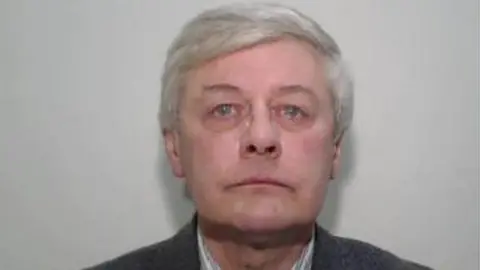'Chernobyl radiation test' abuser gets further jail time
 Greater Manchester Police
Greater Manchester Police A theology student who carried out sex attacks during fake radiation examinations following the Chernobyl nuclear disaster in 1986 has been jailed for a further four years and eight months.
Between 1986 and 1988 John Beaumont, now 66, targeted three fellow students at St Andrews University - two male and one female - by saying he was conducting radiation testing.
Beaumont - a former trainee church minister and funeral celebrant - pleaded guilty at a hearing in Edinburgh in October 2023 to three charges of indecent assault.
He is currently serving 13-and-a-half years in jail after admitting similar offences at a court in Manchester in 2017.
Prosecutor John McElroy KC told the previous hearing that one victim recalled after the Chernobyl nuclear disaster in the former Soviet Union that there were concerns about the effects of radiation.
Beaumont later claimed he was working for the Ministry of Defence (MoD) and showed the fellow student a form of identification.
He said he was carrying out "sampling" as certain individuals had "a type of protein" that reacted adversely to the nuclear radiation from Chernobyl.
Mr McElroy said: "Beaumont said he had been tasked to take discreet and secret samples from these individuals for monitoring."
Beaumont further claimed the testing was for the victim's "own good" as he had an increased risk of cancer.
The advocate depute said: "On hearing this, the man was terrified and believed what Beaumont was telling him was true."
Beaumont produced a briefcase with a Geiger counter inside and copies of an Official Secrets non-disclosure agreement.
There was also a box of rubber gloves and a number of syringes.
'Terrified and dismayed'
Mr McElroy said: "The man recalled he felt terrified and dismayed throughout this examination by Beaumont."
Beaumont later told the man the MoD were "happy" with the test results - but added that further checks on the victim were required.
In a diary entry, the student wrote: "Today I had to give J samples, which was embarrassing, but joy, all is over now. Free again."
He calculated that Beaumont subjected him to being jabbed by a syringe more than 50 times.
The second male victim said Beaumont told him he needed to assess radiation in his body and was instructed to sign the Official Secrets Act.
The third student described Beaumont as very convincing, leading her to undress in front of him before being assaulted.
Janice Green, defending, asked the judge to make the sentences run concurrently.
She said: "There was no physical injury but psychological harm which is more connected to the breach of trust as the victims all believed for a long time that they were part of research.
"It wasn't until 2017 when matters were public that they became aware.
"They came forward in 2022 and it is not clear why that was.
"If these matters had been prosecuted along with the other offences, it is unlikely to have been a greater sentence than 13-and-a-half years."
'Gross breach of trust'
Lord Mulholland told Beaumont that he carried out a "gross breach of trust" on his victims.
The judge said: "You pled guilty to three very serious cases of indecent assaults perpetrated on three young impressionable students at the university where you were a student and a warden.
"You preyed on their experience and pretended to be employed by the Ministry of Defence to take samples to check for radiation levels after the Chernobyl nuclear disaster."
He said the samples were taken from intimate areas of the students' bodies.
"You are predatory and used your status and maturity to prey on them," the judge added.
"I don't think it is appropriate that the sentence runs concurrently as that will mean you won't be punished in any way other than denunciation for the offences you pled guilty to.
"I order that this runs consecutive to the sentence you are already subject to."
Beaumont had latterly been working as a self-employed funeral celebrant for 17 years.
